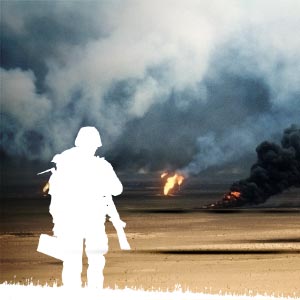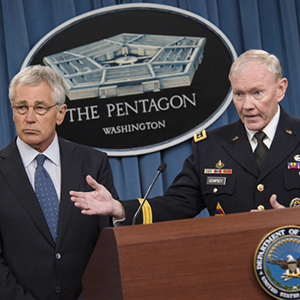In a recent opinion piece in the Boston Globe, BU’s Andrew Bacevich weighs in on the Gordian knot of the upheaval in Syria: when it comes to understanding the conflict’s historical context and implications, Washington “is manifestly clueless and powerless.” As daily news updates cloud an already complicated picture of splintering rebel factions, an obstinate Syrian president, Bashar Assad, the arrival of Russian missiles to bolster government forces, and talk of peace negotiations and a no-fly zone, President Barack Obama is under growing pressure to act.
Bacevich, a College of Arts & Sciences professor of international relations and history and a West Point graduate and former US Army colonel, is firmly opposed to US military intervention. “Anyone who thinks Washington can bend” the process of people exercising their right to self-determination “to suit our own purposes needs to undertake a remedial study of the Iraq War,” writes Bacevich, whose books include Washington Rules: America’s Path to Permanent War and The New American Militarism: How Americans are Seduced by War.
Bostonia asked Bacevich why intervention of any kind in Syria would be misguided, what the wars in Iraq and Afghanistan should teach us, and the fading promise of the Arab Spring.

Professor of international relations Andrew Bacevich. Photo by Kalman Zabarsky
Bostonia: You write that US intervention in Syria wouldn’t affect “the tsunami of change that is engulfing the Islamic world.” Do you believe the same holds true for the outcome of international peace initiatives?
Bacevich: Yes, very much so. It’s an illusion to imagine that outside intervention in the Syrian civil war will somehow have a calming effect on the region.
If the United States does decide to intervene, is there any historic model for a successful strategy to get in and get out?
Sure. There’s Lebanon in 1958, the Dominican Republic in 1965, Grenada in 1983, and Panama in 1989. The problem is that the situation in Syria is completely different. So there is little reason to expect an in-and-out success.
How much do we know about the anti-Assad forces? Aren’t rebel forces just as guilty of human rights abuses as government forces?
From what I read, we don’t know enough. That is, we don’t know enough to be able to say with any certainty what would be the character of a post-Assad political order. To put it another way, there exists a distinct possibility that after Assad would come a more militant and more dangerous regime.
What options short of military conflict do the United States and/or other nations have to intervene to stop human rights abuses in Syria?
The option that the Obama administration is pursuing—work with others to put the squeeze economically on Assad while also seeking a diplomatic solution. Maybe it will work. So far it hasn’t.
Beyond the security of Israel, are there any compelling US interests in Syria?
The immediate US interests are modest. I don’t know that Syria has or produces anything that’s critically important to the well-being of the American people. We do have a pronounced interest in regional stability, very much threatened by events in Syria. But our ability to promote stability is limited. Our principal instruments of power—aircraft carriers, long-range bombers, and precision-guided munitions—aren’t especially relevant.
Do you see any benefits, short-term or otherwise, from a no-fly zone, and would it be enforceable?
Arguably, a no-fly zone would tilt things in favor of the militants. But you come back to that prior question: do we really want them to win?
Are there any circumstances under which the United States would be wise to intervene militarily in Syria?
My problem with this question is that it assumes that armed intervention necessarily offers the primary way to “solve” a problem. Well, what problem should we be attempting to solve in Syria? Many observers are understandably appalled by the suffering of Syrians who are fleeing the civil war. Is suffering the problem we want to “solve”? Okay, then let’s invite Syrian war refugees who wish to do so to resettle in the United States. That would do more good for more people than dropping bombs on the Syrian army.
How do you envision the Syrian conflict playing out? What are the comparisons to the prolonged bloodshed in Lebanon?
It’s always difficult to predict how any armed conflict will turn out. Recently, the Assad regime has demonstrated surprising resilience. So at the moment, it appears that the war is likely to drag on for quite some time. But that and $1.50 will buy you a cup of coffee.
Given what’s happening in Syria and elsewhere in the Middle East, did the United States misread the meaning and implications of the so-called Arab Spring?
Well, at the outset there was a reflexive hope that popular uprisings would quickly and smoothly translate into the emergence of democratic governments. The hope was probably naïve, but it was also understandable. With the passage of time, it becomes more apparent that we really don’t know what the Arab Spring will produce. Come back and ask me in 10 years.
Militarily, what are the most important lessons that the wars in Iraq and Afghanistan have taught us?
We err in lumping the two together, so let me treat them separately. The most important lesson of the Iraq War is that preventive war doesn’t work. Therefore, we should choose war only as a last resort. The most important lesson of the Afghanistan War is that except in very specific circumstances, nation-building is a thankless task. Therefore, in choosing war, we would do well to keep our expectations modest.
The US government and to a large extent its citizens fear Islamic majority rule spreading across the Middle East. Is that fear unfounded?
There is no alternative to Islamic majority rule in the Middle East. Muslims form the vast majority of the people living there.

















































Unfortunately Syria will be damaged that nobody stops the battles there , we wish that the usa will do something really .